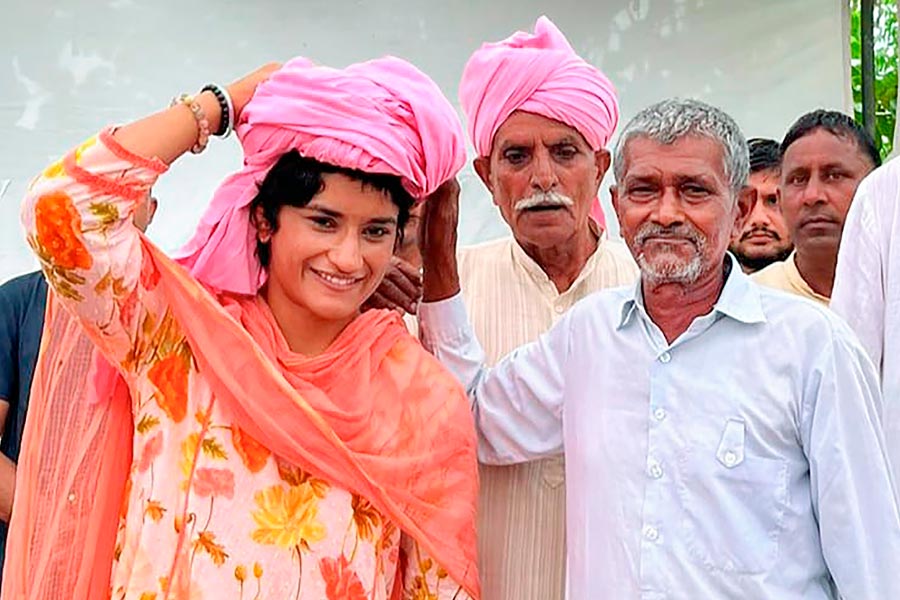Haryana had witnessed a surprising electoral outcome. The state had experienced a series of protests — by farmers against farm laws, the youth with regard to the Agnipath scheme, by women wrestlers against alleged sexual assault by a Bharatiya Janata Party politician. In light of these protests, it was assumed that the BJP would lose the assembly elections. But it won the polls. It was then argued that these protests had been concentrated among the Jats only. This, the argument went, led to a Jat versus non-Jat polarisation in the polls. In order to understand the dynamics at play, we decided to visit Haryana and meet Jat farmers and a few farmer leaders who had been active during the farmer protests at the Singhu border.
Most Jat farmers did not deny the Jat vs non-Jat polarisation on the ground. They, however, feel this was made possible because the BJP made villains out of Jats. They further observed that insignificant conflicts between Jats and non-Jats over petty, everyday issues were blown out of proportion by BJP and Rashtriya Swayamsevak Sangh workers in the villages. They now realise that this is also how the Hindu-Muslim division is created and the majority community falls ‘victims’ to misinformation.
Most respondents argued that all castes and communities co-habit. Even Jats and Dalits have close interactions; they have also inter-married in some instances. One of the respondents said, “We are together but at election time we get divided.” The Dalit respondents agreed: “Yes, we do not vote where Jats vote.” This intriguing aspect could perhaps be explained by the fact that social coexistence based on everyday interdependencies does not eradicate struggles over power and anxieties of domination and discrimination.
Jat farmers also observed that the non-Chamar Dalits, mostly Valmikis, voted for the BJP after the sub-classification of reservation. Interestingly, the BJP benefits from such divisions not only among Dalits and OBCs but also among Jats. If all political parties put up Jat candidates in a particular constituency, then the Jats get divided along gotras. This is how the BJP got a section of Jat votes in the recent polls. The BJP also freely distributed BPL cards before the polls. These cards are distributed by community/caste mukhiyas and the castes lower in the pecking order vote in accordance with the diktats of the mukhiyas many of whom are connected to the BJP politically or are favourably disposed towards the party on account of incentives. Many felt that Dalits and OBCs voting for the BJP thus had nothing to do with a shift in politics.
As we travelled further, we arrived at a village where we witnessed a protest by Jats led by a farmer leader who was active during the farm protests. The protest was against police inaction related to the case of a double murder of two members of a local Jat family. The murders were allegedly committed by a Dalit youth but the farmer leader and others did not see it as a social or a caste conflict. Instead, the farmer leader argued that those Dalits who had voted for the BJP have realised their mistake and that a new Jat-Dalit unity will emerge in the future. He, however, said that it is difficult for Jats and OBCs to come together because the OBCs are not prepared to accept Jat leadership. This point raises the intriguing sociological dimension of unequal castes being in a better position to strike an alliance than those castes that are in a relatively comparable situation.
The Jat farmer leader’s analysis was corroborated at an event organised on the occasion of the birth anniversary of Sir Chhotu Ram. The event not only had prominent Jat political leaders and khap chiefs but also a local leader of the BAMCEF who spoke eloquently about caste unity. In the course of our interaction, it was pointed out that many khap leaders are corrupt and they do not allow new leaders to emerge. Such leaders are responsible for the BJP’s return to power in Haryana.
Ajay Gudavarthy is Associate Professor at JNU. Mahesh Choudhary is a freelance journalist










